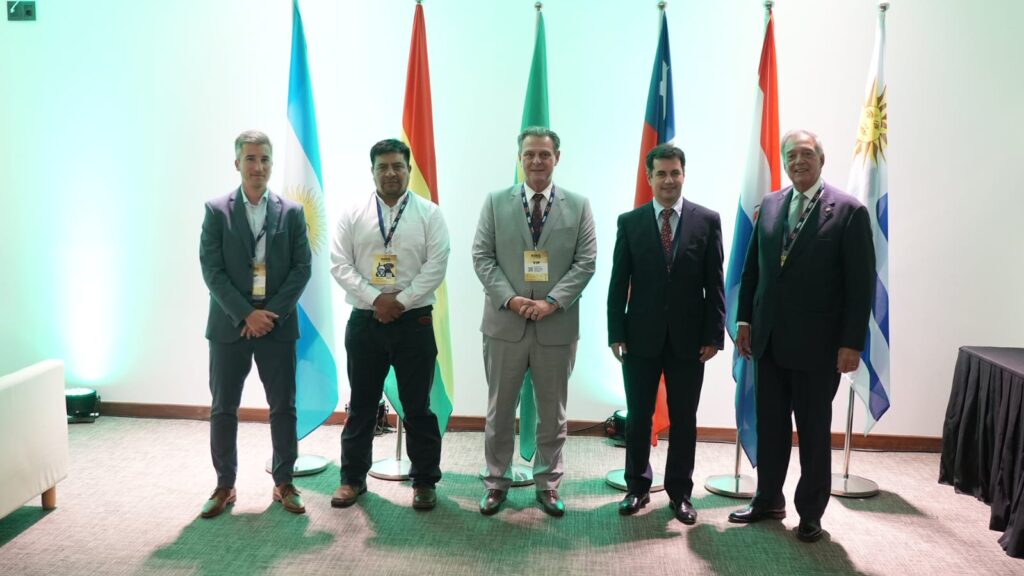
Punta del Este, Uruguay, 12 February 2025 (IICA) – The ministers of Agriculture of the Southern Agricultural Council (CAS) member countries ratified their commitment to regional integration with regard to agrifood policies and discussed the implications of the Mercosur-European Union agreement for trade in the sector.
The city of Punta del Este, Uruguay, hosted the latest meeting of this forum, which has played a critical role in defining the countries’ common agricultural agenda over the last twenty years.
The participants included Sergio Iraeta, Secretary of Agriculture, Livestock and Fisheries of Argentina and President pro tempore of CAS; Carlos Fávaro, Minister of Agriculture and Livestock of Brazil; Yamil Flores, Minister of Rural Development and Lands of Bolivia; and Fernando Mattos, Minister of Livestock, Agriculture and Fisheries of Uruguay, who is also the current chair of the Inter-American Board of Agriculture (IABA).
Also in attendance were Alfredo Fratti, the incoming Minister of Livestock, Agriculture and Fisheries of Uruguay, who will assume office on 1 March, as part of the new government of President elect Yamandú Orsi; and the President-designate of Uruguay’s National Agricultural Research Institute (INIA), Miguel Sierra.
The Director General of the Inter-American Institute for Cooperation on Agriculture (IICA), Manuel Otero, tuned into the debate via video conference, whereas the Institute was represented in person by IICA Representative in Brazil, Gabriel Delgado. Mr. Delgado will also serve as the Technical Secretary of the forum, on behalf of the hemispheric organization for rural development.
They were also joined by the Deputy Minister of Livestock of Paraguay, Marcelo González, representing the Minister of Agriculture and Livestock, Carlos Giménez; the National Director of the Chilean Office of Agricultural Studies and Policies (ODEPA), Andrea García, representing the Minister of Agriculture, Esteban Valenzuela; Agustín Tejeda, Argentina’s Undersecretary of Agricultural Markets and International Market Access; and the President of the Brazilian Agricultural Research Corporation (EMBRAPA), Silvia Massruhá.
The meeting took place at the Punta del Este Convention Center during the Agro en Punta agroindustrial exhibition.
CAS is a forum for regional consultation and coordination of action on issues related to agricultural policy. It was established in 2003 and is made up of the ministers of Agriculture of Argentina, Bolivia, Brazil, Chile, Paraguay and Uruguay. IICA oversees the forum’s Technical Secretariat.
In addition, to the core structure comprised of the six ministers of Agriculture, CAS relies on a network of regional technical support groups that uphold and implement the ministerial decisions.
Opportunities and challenges
The ministers discussed the possible opportunities and challenges for agriculture in the region, arising from the agreement between Mercosur and the European Union (EU), which was announced in December, after 25 years of negotiations. They also echoed concerns regarding Regulation EU 2023/1115 on Deforestation-free Products, whose entry into force was postponed, given its potential to affect the international food trade, undermine food security and jeopardize family farmers in Latin America.
They all felt that the national laws of each of the countries were capable of strengthening agricultural productivity while fostering environmental conservation and also agreed on the need to intensify joint work to demonstrate to the EU representatives the various production modalities of the region.
The IICA Director General stressed that, “The agricultural institutional architecture in Mercosur and in Chile and Bolivia is unique and we must preserve it. IICA would like to continue assisting CAS to foster sustainable agriculture through public and private sector collaboration”.
Minister Fávaro and the President of EMBRAPA provided details on events that will be organized leading up to the United Nations Climate Change Conference (COP30) in the city of Belem do Pará in November, with a view to establishing a consensus among the regional agriculture sector for this significant regional negotiation.
Fávaro also gave specific details on the Brazilian agriculture sector’s objectives with regard to COP30. The participants also discussed the objectives of the meeting of the Inter-American Board of Agriculture (IABA), IICA’s supreme governing body, which the ministers of the Americas will attend in November, in Brasilia.
Conversation with the WOAH Director General
The meeting featured a virtual conversation with Emmanuelle Soubeyran, Director General of the World Organization for Animal Health (WOAH), the entity coordinating the global response to zoosanitary emergencies and animal disease prevention and control.
The Bolivian minister, Yamil Flores, extended an offer from his government to host the next CAS meeting in Sucre—the city where Bolivian independence was declared in 1825—to coincide with the country’s bicentennial festivities.
The President of Mercosur’s Plant Health Committee of the Southern Cone (COSAVE) presented a proposal prepared by the National Service of Agrifood Health and Quality (SENASA) of Argentina regarding a hemispheric plant traceability system, which will be discussed in various working groups.
The meeting also presented and discussed work taking place in relation to risk management and agricultural insurance, which is considered to be of critical importance, given the greater frequency and intensity of extreme climate events.
Furthermore, various entities made presentations to the ministers, including the Confederation of Family Farmer Organizations of the Expanded Mercosur Region (COPROFAM), the Federation of Rural Associations of Mercosur (FAM), as well as regional organizations such as COSAVE, the Program for Agrifood and Agroindustrial Technology Development in the Southern Cone (PROCISUR) and the Permanent Veterinary Committee of the Southern Cone (PVC).
More information:
Institutional Communication Division.
comunicacion.institucional@iica.int











